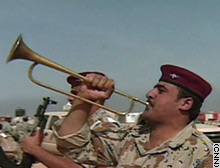CAMP BESMAYA, Iraq

By Hugh RimintonCNN
CAMP BESMAYA, Iraq (CNN) -- The Iraqi honor guard snaps to attention and the bugle player raises his horn. With great pride, he delivers a loud, tuneless warble. It trails off in the whipping desert wind.
This is Camp Besmaya, a training facility for Iraqi army volunteers outside of Baghdad. The bugle welcome is for the head of the Iraqi ground forces, Gen. Ali Ghiran-Majeed.
He and U.S. Brig. Gen. Dana Pittard, the commander of the Iraq Assistance Group, have come to watch final training exercises for 1,500 Iraqi soldiers, who within days will be deployed in Baghdad.
In teams of five, the Iraqis practice clearing houses of insurgents. They kick in doors and fan out through the rooms. Their eagerness fails to disguise a clumsy lack of practiced drilling. (Watch Iraqis get scolded for bad technique )
Some of the men are gray-haired; some are overweight. But they do work together, a rare thing in a nation racked with murderous sectarian fault lines.
"It's definitely a motley crew," says U.S. Army Capt. Mark Tomola.
"I think these guys have more capabilities than we give them credit for sometimes," Tomola says. "At the same time, I'd say we need to make sure we aren't pulling out prematurely and leaving these guys without 'Big Brother' to back them up from time to time."
Trainer Jerry Massey, a 21-year U.S. Army veteran who now works as a civilian contractor, has a bleak view of the proficiency of his duties. To speed the soldiers into the field, they get less than half the time he thinks is ideal for his course. Still, it is better than nothing.
Iraq is on "the brink of anarchy," he says.
"If we leave, look at the guys who died here, who lost their limbs. What does it say about what they gave?" Massey says.
Some Iraqi troops don't get paid
There are about 330,000 trained Iraqi security forces, including 120,000 in the Iraqi army and 135,000 police force members, according to the U.S. Defense Department. But, according to a Defense Department report in March, "The actual number of present-for-duty soldiers is about one-half to two-thirds of the total due to scheduled leave, absence without leave and attrition."
At Camp Besmaya, Iraq's Ghiran-Majeed admits some of his soldiers don't even get paid.
(Watch the growing pains of the Iraqi army )
The Iraqi army's administration has not kept up with its recruitment. Some units don't want to be deployed away from their home districts. On any day, one-quarter of the force is on vacation; soldiers get one week off in every four.
Also compared with a contracted, professional army, Iraqi soldiers are hired as if it's for any job, and they are free to leave whenever they wish. Many do, officials say.
In combat, without American forces present, the Iraqi soldiers have no medical evacuation capacity and no air support. They rely on the U.S.-led coalition for equipment, training and supplies.
"The sacrifice of U.S. soldiers and the families of soldiers ... is incredible," Ghiran-Majeed says, speaking through a translator. "We Iraqis will never forget them. [But] we need the coalition to stay."
Polls of Iraqis this year have consistently shown an overwhelming majority want U.S. forces to leave -- but not just yet.
In Sunni west Baghdad, Abdul Salaam criticizes a passing U.S. patrol, complaining the nearby patrol base has cut off electricity to his neighborhood.
"We have a lot of problems here," he says.
His neighbor complains that the additional U.S. troops in Baghdad mean he feels even more under occupation, but at the same time he reluctantly acknowledges his neighborhood feels more secure.
And as much as the majority of Iraqis say they loathe the American presence, they also fear its end.
Near a Sunni-Shia dividing line in northwest Baghdad, a U.S. patrol pays a visit to a small security hut at a power station. The guard, Jassim Mohammed, welcomes the Americans with glasses of sweet black tea.
He was once one of more than 40 guards at the site. Now all but two have fled and he and a comrade share rolling, six-hour shifts seven days a week. His protection is a battered AK-47 and a new blue British armored vest.
"If the Americans leave," he says, "it will be like this."
His hands make a gesture of powerful collision, the fingers interlocking.
U.S. general: Iraqis can't fight without us
Pittard says the American people are right to hold the U.S. policy accountable in Iraq, but he appeals for patience.
"It takes time," he says. "A huge amount of progress has been made, but we're not there yet."
He cites the Iraqi army.
"In early 2005, there were two struggling IA [Iraqi army] divisions. Now there are 10 very capable IA divisions, and we're working on the 11th and 12th."
Pittard is counted a rising star in the U.S. military, a thoughtful man devoid of swagger. His experience includes a year commanding troops in Diyala province, which has recently descended into bloody chaos.
He is frank in assessing the Iraqi military.
"The Iraqi Security Forces cannot take the fight to the enemy without our assistance at this point," he says.
He says an American withdrawal, like many in Washington are pushing for, "would cause a huge vacuum that the enemies of Iraq would take advantage of. We cannot leave Iraq in disarray."
"We came here in 2003. We cannot leave this nation as a failed state," he says.
A failed state is what almost everyone in Iraq predicts if the Americans go too early. It is one of the very few points of agreement here.
This information is copied from www.cnn.com


0 Comments:
Post a Comment
Subscribe to Post Comments [Atom]
<< Home